Tehran deputy governor defends crackdown on pro-hijab sit-in
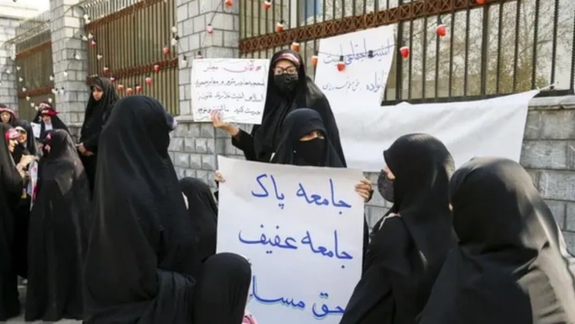
The deputy governor of Tehran has defended the police action against a sit-in by supporters of mandatory hijab outside Iran’s parliament on Friday, saying the gathering was unauthorized.

The deputy governor of Tehran has defended the police action against a sit-in by supporters of mandatory hijab outside Iran’s parliament on Friday, saying the gathering was unauthorized.
Hossein Khosh-Eghbal said on Saturday that outdoor protests or sit-ins must have official permission. “We thank the security and police forces for enforcing the law and maintaining public order,” he said, adding that gatherings without a permit would face a legal response.
His comments came after some Iranian domestic media reported that police dispersed the sit-in on Friday, which coincided with Quds Day. Protesters had been camped outside parliament for several weeks, calling for the enforcement of Iran’s new and more restrictive hijab law.
The law, which increases penalties for violations of the country’s dress code, was passed by parliament in September but has not been implemented. Authorities delayed its enforcement in December following domestic opposition and international pressure.
Drafted in May 2023, less than a year after the Woman, Life, Freedom uprising sparked by the death in custody of Mahsa Amini in September 2022, the law was introduced in response to widespread defiance of compulsory veiling by women and young girls.
Videos shared online appeared to show the protest site being cleared. In the footage, individuals identifying themselves as participants said they were removed by police, taken away and later abandoned near Behesht-e Zahra cemetery and the burial site of Ayatollah Ruhollah Khomeini, south of Tehran.
The crackdown has drawn mixed reactions. Some conservative figures criticized the move, while others aligned with the government welcomed the end of what they described as an illegal protest.
Khosh-Eghbal called on all political groups loyal to the Islamic Republic to avoid “divisive and unlawful behavior,” especially during sensitive times. He said demands should be expressed “wisely and within the legal framework,” and warned that unrest could be exploited by hostile groups.
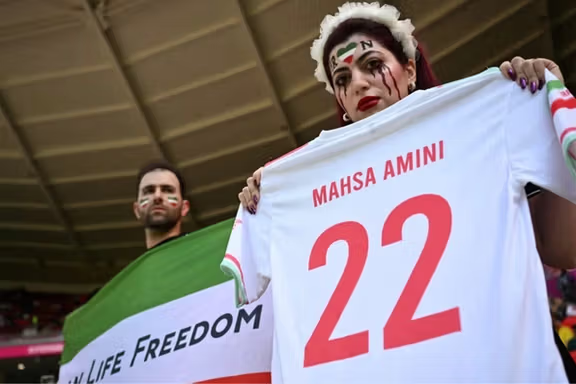
The absence of the usual jubilation after Iran secured a spot in the 2026 FIFA World Cup earlier this week reflects deep societal and political divisions that extend far beyond the football pitch.
Iran's national football (soccer) team, Team Melli, secured a World Cup spot with a draw against Uzbekistan on Tuesday. In the past, such a victory would have brought millions to the streets in celebration, but this time, the public response was largely indifferent.
Media outlets in Tehran, such as Rouydad24, and numerous social media users noted this apathy. "The national football team qualified for the World Cup, but there was no enthusiasm in the public sphere or on social media. The event seemed so insignificant that people behaved as if they had no connection to the team," journalist Mohammad Parsi wrote on X.
In stark contrast, when Iran qualified for the 1998 World Cup by defeating Australia, millions celebrated in the streets nationwide. The euphoria of that moment, when people danced in public without fear of morality police intervention, remains a historic memory.
Football has long been Iran's most popular sport, but many Iranians say they no longer take pride in their national team. This shift is largely political, rooted in the 2022-2023 "Woman, Life, Freedom" protests, sparked by the death of 22-year-old Mahsa Amini in September 2022 while in morality police custody for allegedly violating hijab laws.
During the nationwide protests, Team Melli initially showed solidarity with the demonstrators. Some players, including forward Sardar Azmoun, openly condemned the brutal crackdown. Many others wore black armbands and refused to sing Islamic Republic's anthem before their World Cup match against England in November 2022, as a gesture of support.
However, under apparent pressure from security forces, the team’s public support for the protesters waned. This led to widespread disillusionment among fans, who began referring to the squad as the government’s or "mullahs' team."
The team's meeting with then-president Ebrahim Raisi before leaving for Qatar angered many supporters who did not expect the players to ignore the continued crackdown on protesters. Legendary striker Ali Daei and outspoken star Ali Karimi, charged in absentia for supporting the protests, said they rejected FIFA and Qatar’s invitation to watch the matches in Doha. The unpopularity of Team Melli reached a peak in February 2024 when thousands celebrated its defeat to Qatar in the Asian Cup tournament.
Inter Milan striker Mehdi Taremi, who scored both goals in Tuesday’s match, has also faced backlash. Taremi, known for his pro-government stance, was criticized for distancing himself from political issues and denying allegations that the team had been coerced into singing the national anthem.
The declining support has also been evident in dwindling stadium attendance—despite the match attended by President Masoud Pezeshkian falling during the New Year holidays, only one-third of Azadi Stadium’s 100,000 seats were occupied.
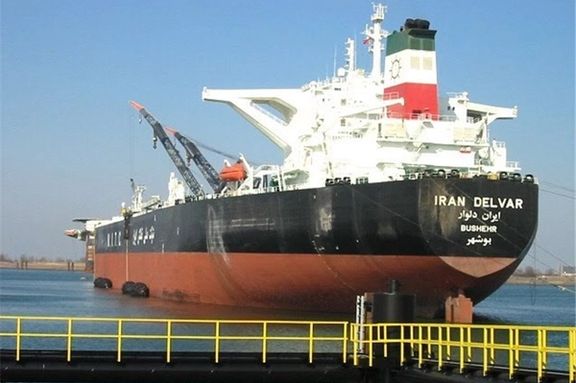
Iran’s oil minister, Mohsen Paknejad, has denied that new sanctions and enforcement efforts by the Trump administration against Iran’s energy exports have had a significant impact.
“Right now, we are still exporting oil. There has been no disruption in our shipment routes,” Paknejad told Iranian state media.
Asked about Washington’s efforts to bring Iran’s oil exports to zero, Paknejad said such statements remain unproven. “All of this is being said for now. What is happening in practice is that we are exporting,” he said.
Asked if Iran is ready to deal with tougher sanctions enforcement by the US, Paknejad said, “Naturally, if any restrictions are imposed on Iran's oil sales, we have taken the necessary measures to respond.”
Paknejad also denied any decline in oil sales, saying Iran set a record for crude exports in the Iranian month of Dey (Dec21–Jan. 20).
Earlier this month, the US Treasury imposed sanctions on Paknejad, breaking with its usual practice of sparing senior political officials. The move was part of a broader effort to tighten enforcement on Iranian oil exports, which Washington says help fund Tehran’s military and security forces, including the Islamic Revolutionary Guard Corps (IRGC).
Paknejad’s comments on Saturday also follow a report earlier this week from Iraq’s Oil Minister Hayan Abdel-Ghani, who said that Iranian tankers intercepted by US forces in the Gulf were found to be using forged Iraqi documents.
"We received verbal inquiries about oil tankers detained by US naval forces. It turned out these tankers were Iranian and were using fake Iraqi manifests," Abdel-Ghani said on Iraqi state TV.
Iran denied the claim, saying its oil exports are conducted “within accepted trade frameworks,” and reaffirmed its position in a call between Paknejad and his Iraqi counterpart on Friday.
The dispute comes amid a broader US effort to crack down on alleged fuel smuggling and sanctions evasion by Iranian-linked networks. In December, Reuters reported that a smuggling network using forged documents was generating at least $1 billion annually for Iran and its allies in Iraq.
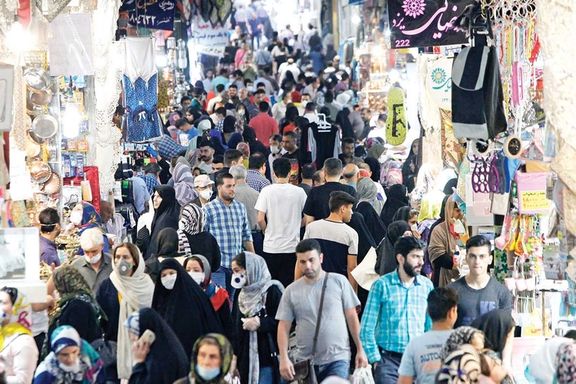
The US government has resumed nearly all Iran-related aid programs that were paused under President Donald Trump’s executive order in January, Iran International can confirm based on an obtained document and interviews with grant recipients.
The State Department had suspended funding for numerous initiatives, including Iranian human rights groups, internet freedom programs, and civil society organizations, as part of a broader review of foreign assistance under the administration’s America First policy.
The freeze, announced on January 20, was initially set for 90 days but the review process appears to have concluded in time, with all but a few of projects focusing on Iran colored green in a list of State Department “active grants” obtained by Iran International.
The State Department did not comment on the specifics of Iran-related grants when contacted by Iran International but confirmed that funding for some programs is proceeding.
"While the US Government's review of all foreign assistance is ongoing, some approved programs are continuing to advance US national interests. This includes some programs in support of the Iranian people," a State Department spokesperson said.
Multiple grantees have also confirmed to Iran International that their funding has been reinstated and that their operations will restart.
Ahmad Ahmadian, an advocate of internet freedom in Iran who leads the efforts of the California-based NGO, Holistic Resilience, in research and development of censorship circumvention technologies.
Welcoming the decision to reinstate funds to organizations like his, Ahmadian suggested that pressuring the rulers of Iran and supporting its people at the same time is not only possible but necessary if the United States wants to effect real change in the country—and beyond.
“The Trump administration’s policy is focused on increasing efficiency and avoiding the start of a new war,,” he told Iran International. “Iranian civil society remains the most promising option to achieve this goal and to change the behavior of the Iranian government.”
Ahmadian agreed that some reform toward efficiency and effectiveness might be required with the State Department grants.
“I believe new projects should demonstrate a clear return on investment, operate with greater transparency, highlight the shared values between the Iranian and American people, and focus more on tangible results,” he added.
Prior to the pause in foreign aid, Washington funded several Virtual Private Network (VPN) services that helped Iranians bypass government censorship. U.S. funding also supported projects aimed at promoting media freedom, strengthening civil society, and documenting human rights in Iran. All of these initiatives were affected by the executive order.
The halt in funding—announced on Trump’s first day in office—was widely criticized by Iranian activists who argued that the decision benefited Tehran’s theocratic rulers above all. The resumption, those affected believe, would turn the table and more.
“The Islamic Republic tried to use the temporary suspension of funds as a propaganda tool, claiming that these projects lacked usability and impact. But the reality is that many have had tangible effects on Iranian society,” one State Department grantee told Iran International, asking to remain unnamed.
“The Trump administration showed that it values Iran-related projects. I anticipate even more funding flowing into this sector. These projects are aligned with the America First policy,” the grantee added.
The State Department has not publicly commented on the status of the review or the reasons for reinstating aid. Both the pause and resumption of funding happened at a time of heightened tensions between Washington and Tehran.
President Trump has ramped up economic and diplomatic pressure on Tehran, issuing an ultimatum to Supreme Leader Ali Khamenei to agree to a deal that curtails Iran’s nuclear program or face severe consequences.
Khamenei has rejected direct talks while pressure persists and rises, asserting that Iran would not bow to American demands.
With both sides hardening their positions, concerns are growing over further escalation, particularly as the US bolsters its military presence in the Middle East and the Indian Ocean.
The most recent US intelligence assessment pointed to Tehran’s diminished influence in the region and the potential of growing discontent at home giving rise to mass protests like those seen in recent years.
The decision to reinstate grants may have had such assessments at heart.
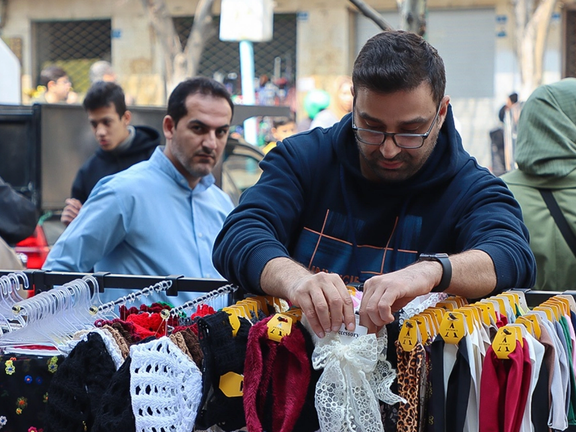
Ordinary Iranians are bearing unprecedented economic pain as their Islamic government's row with its hated enemies Israel and the United States ramps up and Tehran prioritizes military spending to shore up defense and its regional clout.
“It is a real tragedy,” said Mohamad Machine Chian, a senior researcher at the Center of Governance and Markets at Pittsburgh University on the Eye for Iran podcast. “Their quality of life has been steadily dropping for the past couple of years. But especially the past year, it has been a disaster.”
Chian told Eye for Iran that the Iranian government has continued to prioritize funding the Islamic Revolutionary Guard Corps (IRGC) and military ventures over investing in the wellbeing of its citizens.
Since President Masoud Pezeshkian took office, the Iranian currency has halved in value.
With unemployment surging above 70 percent, millions are struggling to afford basic necessities as crippling inflation and poverty grip the nation.
The sharp depreciation has driven inflation above 40 percent, with food prices soaring by as much as 100 percent in some cases. As the crisis deepens, the economic strain on ordinary Iranians is only expected to worsen in the coming months.
Machine Chian said President Pezeshkian missed numerous opportunities to address the deepening crisis and has failed to include a welfare plan in the budget to alleviate citizens' suffering.
“One such opportunity was that President Pezeshkian could have put together next year's budget in a way that convinced the Islamic Republic’s powers to at least, for a year, halt increases in military spending. That could have deescalated the situation,” said Machine Chian.
"This is during a crisis. He (Pezeshkian) should have prioritized the budget for basic necessities. But he prioritized the IRGC," said Machine Chian.
Iran implemented a 200 percent increase in military spending for the Persian year beginning this month and will aim to boost revenue through higher taxes despite a big deficit and a moribund currency besetting the economy.
It's bad...but just how bad?
The economic crisis is the worst Iran has experienced since the inception of the Islamic Republic, according to Mahdi Ghodsi, an economist at the Vienna Institute for International Economic Studies. Remarkably, Ghodsi says that the economy was better even during the eight-year war between Iran and Iraq.
“It's the worst situation, it's the worst condition, the direst condition that Iran has ever experienced,” said Ghodsi.
Ghodsi added that the reasons for this collapse are multifaceted, including Iran's militant stance in the region as a means of preserving the ruling system.
“It’s a dark comedy,” Ghodsi told Eye for Iran. “Leaders of Iran are mingling in a situation of lack of policy because their only objective is to survive. And to survive, they feel the need to initiate wars and increase tensions with other countries.”
Oil revenue: how much does it matter?
The looming uncertainty over a potential war with the United States or a new nuclear deal is also deepening the economic crisis.
Since President Trump took office, the rial has plummeted by 80,000. The administration has imposed new sanctions targeting Iran’s oil industry, including Chinese “teapot refineries” processing Iranian crude.
US Secretary Treasury Scott Bessent recently said, "If I were an Iranian, I would get all my money out the rial now."
The Iranian state relies heavily on oil exports. However, at the current rate of oil exports, the revenue generated is insufficient to cover even basic pension funds, according to Machine Chian.
Iran's oil exports totaled $54 billion in 2024, up slightly from $53 billion in 2023, with volumes averaging 1.5 million barrels per day, according to the US Energy Information Administration.
However, President Trump signed an executive order vowing to reduce Iran’s oil exports to zero. Both Ghodsi and Machine Chian say that while the world markets can endure such a move, the impact on Iran’s economy would be crushing.
Iran currently attempts to stabilize the prices of basic goods and services by injecting US dollars into the economy. But if oil exports fall to zero, the state will lack sufficient foreign currency reserves, leading to further spikes in inflation and continued depreciation of the rial.
This also means Iran would no longer be able to subsidize the price of gasoline.
If the government can't subsidize gasoline prices, then there will likely be an increase in prices this summer, both economists warn.
Ghodsi and Machine Chian said that could lead to nationwide protests similar to the November 2019 protests, which erupted after a sudden increase in fuel prices and quickly spread as a broader expression to fight the establishment. Hundreds were killed and more than 7,000 were arrested.
But according to both economists, any meaningful change in Iran’s leadership through maximum pressure cannot happen without maximum support for the Iranian people.
With the shadow of war looming or a potential nuclear deal, the rial may continue to spiral. Rising inflation and economic hardship will likely fuel further public discontent, while tensions keep diplomatic and military risks high.
You can watch the full episode of Eye for Iran on YouTube or listen on any podcast platform like Spotify, Apple, Amazon or Apple.
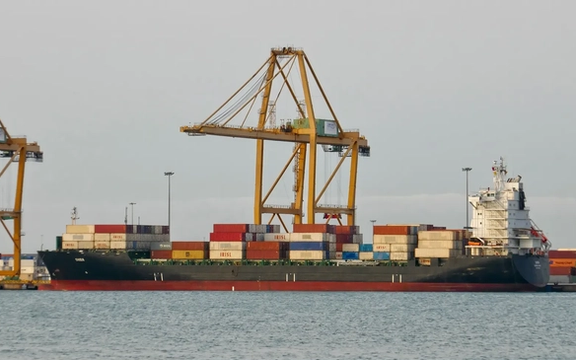
Iranian container ships are suspected of aiding Houthi attacks and transporting weapons to Syria and Russia during repeated visits to the port of Antwerp, investigative outlet Follow the Money (FTM) reported citing Western security services.
The report details how Iranian ships may have used commercial trade through Antwerp to conceal alleged illicit activities.
The vessels delivered arms, weapon components and cargo with dual civilian and military uses during stopovers in Syria and Russia en route to Belgium, the Western security sources cited by FTM were cited as saying.
In Syria, under recently ousted President Bashar al-Assad, these shipments were likely passed on to Lebanon’s Hezbollah militant group, the report added citing unnamed intelligence sources.
Six Iranian ships regularly docked in Syria while travelling between Iran and Antwerp between mid-2022 and late 2024, FTM reported, citing shipping data.
One ship, the Shiba, lingered off Yemen during multiple Houthi attacks, and made at least one unregistered “dark port” call to Syria, FTM said.
The ships were operated by Hafez Darya Arya Shipping (HDS), which is suspected to be a front for Iran’s sanctioned state shipping firm IRISL, the report said.
Belgian authorities inspected one vessel in 2024 but found no weapons, FTM reported. The EU banned the ships from its ports in late 2024 after sanctioning IRISL.